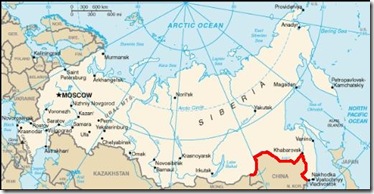# 2719
Sino-Russian border in Red.
Russian and China share a 4000 km border, and as one might imagine, Russian officials are watching the resurgence of bird flu cases in China with interest.
Russia has dealt with bird flu outbreaks in poultry, and has detected antibodies to the virus in wild birds, particularly in Siberia. They have not, however, reported any human cases to date.
Gennady Onishchenko, Russia's chief Sanitary (public health) doctor, has issued orders for establishing - quarantine stations at crossings on the Chinese border with disinfectants, individual protective clothing and equipment to identify people with increased body temperature arriving from China and other countries of bird flu concern.
Obviously, they would like to keep their record of no human cases intact.
This report from RIA Novosti.
Russia tightens disease control amid bird flu deaths in China
15:25
|
28/ 01/ 2009
MOSCOW, January 28 (RIA Novosti) - Russia's chief sanitary official has instructed regional authorities to tighten disease control measures amid a rise in the number of bird flu cases in China, his press service said on Wednesday.
According to the World Health Organization, eight cases of human bird flu infection have been registered worldwide in 2009 - two in Egypt and six in China. Five people in China have died. However, the WHO said they did not believe China was facing a bird flu epidemic as all the cases were scattered around the country and appear to be random.
"He [Russia's chief sanitary doctor Gennady Onishchenko] instructed to provide quarantine stations at crossings on the Chinese border with disinfectants, individual protective clothing and equipment to identify people with increased body temperature arriving from China and other countries of bird flu concern," the press service said.
Onishchenko also urged improved measures of bird flu vaccinations for people working at poultry farms.
Disease control will also be tightened at markets selling live poultry and pet birds, as well as at airports receiving flights from China and other bird flu-affected countries.
A total of 399 cases of human infection with the deadly H5N1 strain of bird flu have been registered worldwide since 2003, in 252 of them have been fatal. No confirmed cases of human bird flu infection have been reported in Russia.
